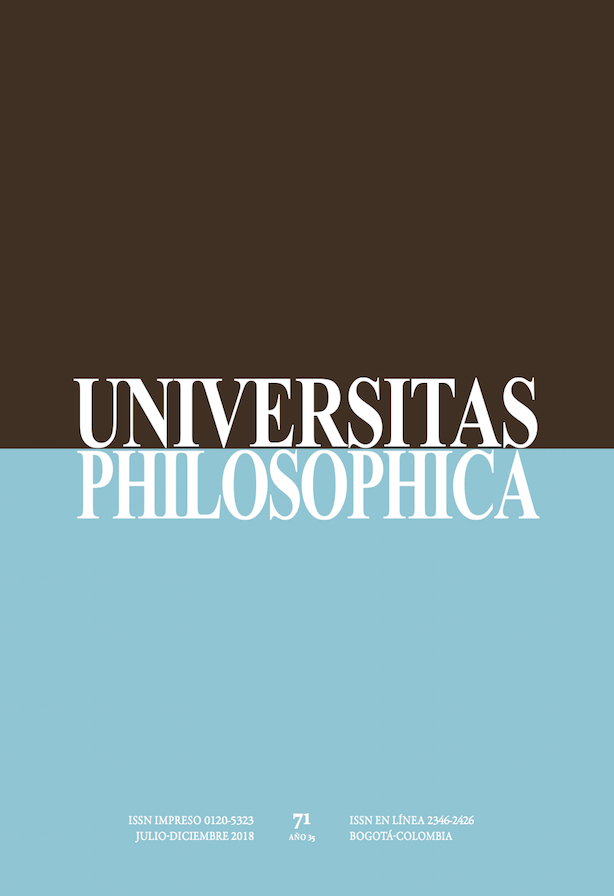Abstract
The modern concept of reason called one of the fundamental tenets of Christianity into question: the universal value of the salvation brought to all humanity by Jesus. From a modern point of view, it is not possible for a historic and contingent event, such as the death of Jesus, to bear universal meaning for men of all times. In this article I aim to show how René Girard’s anthropological hypothesis offers an alternative answer to the seemingly impossible universale concretum.
Béjar Bacas, J. S. (2017). La vocación universitaria de la teología. Scripta Theologica, 49, 701-726.
Benedicto XVI. (2006, septiembre). Fe, razón y universidad. Recuerdo y reflexiones. Discurso pronunciado en el Aula Magna de la Universidad de Ratisbona, Alemania.
Benedicto XVI. (2008, enero). Discurso preparado por el Santo Padre Benedicto XVI para el encuentro con la Universidad de Roma “La Sapienza”. Recuperado de: http://w2.vatican.va/content/benedictxvi/es/speeches/2008/january/ documents/hf_ben-xvi_spe_20080117_la-sapienza.html
Bonete, E. (2015). Filósofos ante Cristo. Madrid: Tecnos.
De Cusa, Nicolás. (1983). De docta ignorantia. En: L. Baur, H. G. Senger, R. Klibansky, K. Bormann, & R. Steiger. (Eds.). Opera Omnia (Vol 1). Hamburg: In Aedibus Felicis Meiner.
Girard, R. (1983). La violencia y lo sagrado. (Trad. J. Jordá). Madrid: Anagrama. Girard, R. (1982). El misterio de nuestro mundo. (Trad. A. Ortíz). Salamanca: Sígueme.
Girard, R. (1986). El chivo expiatorio. (Trad. J. Jordá). Barcelona: Anagrama. Girard, R. (1996a). Cuando empiecen a suceder estas cosas... (Trad. A. Barahona Plaza). Madrid: Encuentro.
Girard, R. (1996b). The Anthropology of the Cross: A Conversation with René Girard. J. G. Williams. (Ed.). The Girard Reader (pp. 262-288). New York:
Crossroad.
Girard, R. (1997). Entrevista con René Girard. En: Literatura, mímesis y antropología (pp. 202-230). (Trad. A. L. Bixio). Barcelona: Gedisa.
Girard, R. (2002). Veo a Satán caer como el relámpago. (Trad. F. Díez del Corral). Barcelona: Anagrama.
Girard, R. (2006a). Aquel por el que llega el escándalo. (Trad. A. Barahona Plaza). Madrid: Caparrós Editores.
Girard, R. (2006b). Los orígenes de la cultura. Conversaciones con Pierpaolo An- tonello y Joao Cezar de Castro Rocha. (Trad. J. L. San Miguel de Pablos). Madrid: Trotta.
Girard,R. (2010).Clausewitz en los extremos. Política, guerra y apocalipsis.(Trad. L. Padilla López). Buenos Aires-Madrid: Katz.
Girard, R. (2011). El sacrificio. (Trad. C. Bonet Ponce). Madrid: Encuentro. González de Cardedal, O. (1997). La entraña del Cristianismo. Salamanca: Secretariado Trinitario.
González de Cardedal, O. (2001). Cristología. Madrid: BAC.
Groot, G. (2008). Emociones de segunda mano. Conversación con René Girard. En: Adelante, contradígame. Filosofía en conversación (pp. 55-72) (Trad. C. Ginard Féron). Madrid: Sequitur.
Henrici, P. (1999). La Chiesa e la filosofía. In ascolto della ‘Fides et Ratio’. Gregorianum, (80), 635-644.
Lessing, G. E. (1982). Sobre la demostración en Espíritu y Fuerza. En: A. Andreu Rodrigo. (Ed. y Trad.). Escritos filosóficos y teológicos (pp. 445-452). Madrid: Editora Nacional.
Moreno Fernández, A. (2012). La evaluación de la modernidad en la teoría mimética de René Girard. Deseo, violencia, religión y libertad (Tesis de doctorado sin publicar). Universidad de Granada, España.
Pié-Ninot, S. (1999). La Encíclica Fides et Ratio y la TF: hacia una propuesta. Gregorianum, (80), 645-676.
Pié-Ninot, S. (2006). La teología fundamental: “dar razón de la esperanza” (1 Pe3,15). Salamanca: Secretariado Trinitario.
Ratzinger, J. (2004, noviembre 17). La fuerza de la razón contra el relativismo. Diálogo entre el cardenal Ratzinger y el historiador Galli della Loggia. Aceprensa. Recuperado de: http://www.interrogantes.net/Joseph-Ratzinger-La-fuerza-de-la-razon-contra-el-relativismo-Aceprensa-170XI004/menu-id-29.html
Ratzinger, J. (2005). Fe, verdad y tolerancia. El cristianismo y las religiones del mundo. (Trad. C. Ruiz-Garrido). Salamanca: Sígueme.
Ratzinger, J. (2015). Jesús de Nazaret. P. Cervera & C. Granados. (Eds.). Madrid: BAC.
This journal is registered under a Creative Commons Attribution 4.0 International Public License. Thus, this work may be reproduced, distributed, and publicly shared in digital format, as long as the names of the authors and Pontificia Universidad Javeriana are acknowledged. Others are allowed to quote, adapt, transform, auto-archive, republish, and create based on this material, for any purpose (even commercial ones), provided the authorship is duly acknowledged, a link to the original work is provided, and it is specified if changes have been made. Pontificia Universidad Javeriana does not hold the rights of published works and the authors are solely responsible for the contents of their works; they keep the moral, intellectual, privacy, and publicity rights.
Approving the intervention of the work (review, copy-editing, translation, layout) and the following outreach, are granted through an use license and not through an assignment of rights. This means the journal and Pontificia Universidad Javeriana cannot be held responsible for any ethical malpractice by the authors. As a consequence of the protection granted by the use license, the journal is not required to publish recantations or modify information already published, unless the errata stems from the editorial management process. Publishing contents in this journal does not generate royalties for contributors.


